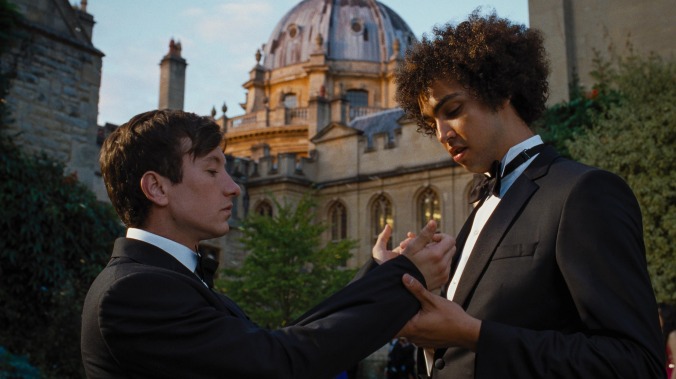Barry Keoghan as Oliver and Archie Madekwe as Farleigh in Saltburn Photo: MGM/Amazon Studios
The darkly comedic and corrupt whims of the wealthy are on full display in filmmaker Emerald Fennell’s racy thriller Saltburn. The cheeky provocateur’s follow-up to her Oscar-winning directorial debut, Promising Young Woman, Saltburn wages war on the stuffy British elite by way of a lower-class scholarship student, who charms and smarms his way into an aristocratic classmate’s life. If this premise sounds familiar, it’s because it parallels that of The Talented Mr. Ripley, not solely with a similar overarching plot, but also within its sentiments. However, unlike that aforementioned film, Fennell’s feature all-too-frequently fumbles, misunderstanding character construction and misjudging the audience’s intellect in sussing out her anti-hero’s deviant actions.
Oxford University freshman Oliver Quick (Barry Keoghan), whose name and lower-class stature feel Dickensian, spends much of his incoming semester with his face pressed up against the metaphorical glass separating him from his rich, popular dorm-mates. His opportunity to ascend finally arrives when he spots handsome Felix Catton (Jacob Elordi) in desperate need and lends him a helping hand, or a working bike as it were. One re-establishing chat soon thereafter in their local pub solidifies the two as fast friends, partying at night and hanging out during the day. Their bond draws the evil eye of Felix’s jealous cousin Farleigh (Archie Madekwe), who’s been at odds with Oliver from day one.
However, just as finals are approaching, Oliver is hit with an emotional wallop: a call from his mom that his dad has died. Since Oliver has confided in Felix that his home life is absolute rubbish, Felix kindly invites his newfound friend to stay the summer at his home, Saltburn Castle, located on a palatial estate in the English countryside. It’s there Oliver meets Felix’s eccentric family: his perpetually perky father James (Richard E. Grant), gossiping, narcissistic mother Elsbeth (Rosamund Pike), and sultry sister Venetia (Alison Oliver). Lazy days sunbathing, touring the libraries, and playing drunk tennis followed by fancy dress dinners become Oliver’s life of luxury. And, despite being forewarned, he finds himself totally seduced by this way of living.
Along the same lines as her previous picture, Fennell puts her keen eye for visual flourish to brilliant use. Rather than utilizing a widescreen format, she harnesses the claustrophobia of a tight Academy aspect ratio for extra oomph. Yet the spacious outdoors, sprawling castle interiors, and stifled secrets contained within those walls all photograph as tactile and expansive. She places characters in power positions in the frame to connote emotion and capture their psyches. It’s interesting to note where the pair of pals are placed on equal footing in the frame (which happens twice) and where they’re blocked otherwise. Inverted images of Oliver are perhaps the most aesthetically striking.
Fennell and her collaborators conduct this symphony with assured artistic panache. Linus Sandgren’s cinematography illuminates the darkened, recessed corners of characters’ deceptions, making them shine bright. Suzie Davies’ production design echoes symbolism found in the narrative, like the knotty labyrinth maze on the property, a fly strip dangling from a chandelier, the repetitious use of splintered mirror imagery, and the home’s red curtains and walls. Anthony Willis’ foreboding score is dark, lustful, and romantic, infusing the picture with gothic overtones.
Nevertheless, the material’s superficial glossy polish covers up insipid innards. The puppet-master aspect powering the picture culminates in a wholly unnecessary, maddening reveal. We’ve figured it out far in advance, thanks to clunky foreshadowing that leaves behind breadcrumbs the size of loaves. From the opening credits imagery with a thorny, overgrown title card design and booming “Zadok the Priest” coronation anthem by Handel on the soundtrack, we’re piecing together the juxtaposing clues of who this dastardly character really is behind the mousy, shy exterior persona he’s very obviously selected. We are keenly aware of his machinations the entire time. We don’t need a third act “here’s how I did it” monologue to spell things out—and yet there’s one awaiting us.
Oliver’s ominous side shows itself early on in Act One when he drunkenly insults a girl while making out with her in his dorm. We also pick up on the fact he’s a quick study in his read of human behavior, insidiously weaponizing others’ issues for his gain, like Farley’s passive aggressiveness, Felix’s genuine kindness and Venetia’s masochistic need to be controlled. And we can’t help but take stock of the trinkets Oliver intensely pores over (like the antique plate and wind-up toy depicting the Catton family as dancing clowns) as significant hints of what’s to come. The handful of explicit scenes feel like they’re included solely for shock value, coming across as schlocky and inert.
That’s not to say the performances are at fault. The entire ensemble elevates the subpar elements in the material. Keoghan is absolutely fearless. A little creepy and completely composed, he’s in full command of scenes that push the envelope and those that study character depths. He taps into a raw, primal energy and unsettling, dangerous pulse. Elordi exudes a natural charisma and magnetism. He injects a sense of strength into his character’s softness. Pike is delicious as the conceited matriarch of the house, delivering much of the film’s levity. Carey Mulligan is terrific in a supporting role, playing Elsbeth’s latest charity case, Pamela, who dresses loud but speaks softly.
With many films containing commentary on class disparity already in the zeitgeist, Saltburn’s sentiments aren’t much different and, worse, it speaks out of both sides of its mouth when depicting the affluent as abhorrent monsters dressed in luxurious designer clothing. Fennell fails to get under the surface to dissect their folly, and placing a modicum of rootable interest in this protagonist (whether you’re rooting for or against him) leads to a confusing outcome. Perhaps that’s the real burn.
Saltburn opens in select theaters on November 17 and in theaters everywhere on November 22









































